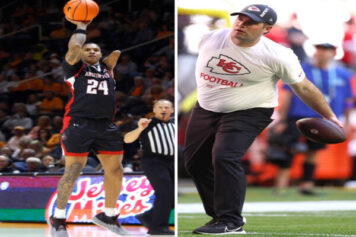The National Football League is celebrating the 55th Anniversary of its biggest event on February 7th as Patrick “GOAT IN WAITING” Mahomes and the Kansas City Chiefs take on Tom “GOAT” Brady’s Denver Broncos in Super Bowl 55 at Raymond James Stadium in Tampa Bay, Fla.
Over the next few days, The Shadow League will be sharing some of our most memorable reflections from the game that has become much bigger than football, especially during these COVID-19 pandemic-ridden times, morphing into an essential piece of the tapestry that defines who we are as an American society.
*********************
The resounding performance by Doug Williams against the Denver Broncos on January 31, 1988, in Super Bowl XXII changed the narrative about African-American quarterbacks and was a chainsaw in cutting down prevailing myths and stereotypes about the competency of black signal-callers.
Today’s elite Black quarterbacks — from Black Super Bowl champions Patrick Mahomes and Russell Wilson to multi-faceted signal callers like Deshaun Watson and Kyler Murray — have Williams to thank for obliterating false stereotypes and becoming the first brother to bring home a Lombardi Trophy.
READ MORE: Black QB Chronicles: Russell Wilson Is Probably The Most Important Black Quarterback In NFL History
His flawless fortitude on the world stage opened doors for the plethora of black signal-callers we’ve enjoyed in our lifetimes. The 2020 NFL season began with a record 10 Black quarterbacks starting on opening day.
READ MORE: Black Quarterback Chronicles: 10 Black Starting Quarterbacks First Time In NFL History
On that historic day back in 1988, Williams received his blessings for being a pioneer, a sacrificial lamb and martyr of sorts as his life journey and purpose became more important than football. He took some L’s along the way that not only benefited elite black QBs but allowed suspect soldiers like Akili Smith and Vince Young opportunities to fail.
READ MORE: Vince Young Was Deshaun Watson’s Inspiration
Williams became a heroic figure and racial ground-breaker in 1988. We still celebrate him today as Patrick Mahomes looks to become the first Black quarterback to win back-to-back Big Games. To achieve such accolades, Mahomes first has to get past Tom Brady, the prototype for the pocket passing quarterbacks of yesteryear.
READ MORE: Tom Brady Leaves Patriots, Determined To Win Without Belichick
That night before Super Bowl XXII, Williams spoke to his legendary college football coach at Grambling University. Eddie Robinson told Doug that it was just another football game…” but you and a lot of people have a lot riding on it.”
My family was one of those people. Having never seen an African-American QB perform on the grandest stage in pro football, we were very much anticipating the game. We were a household full of Giants fans who despised the Redskins. But the cultural significance of Williams’ opportunity resonated profoundly with my Pops.
That day, we were Doug Williams fans and therefore rooting for the team formerly known as The Redskins.
Back then, Doug was like the only hope. Now we have enough melanated starting quarterbacks to at least have a Top 5 list each week.

Thanks, Dougie.
Pops actually became a fan of Williams, the second black quarterback to earn a starting job in NFL history, when Williams was selected in the first-round of the NFL Draft in 1978 by the Tampa Bay Bucs. The young, controversial black bomber took a team who had never been to the playoffs and elevated them to the postseason three of his four years there, reaching the NFC Championship in ’79.
However, bigotry in pro sports was still prevalent back then and a racist Bucs ownership didn’t want to pay Williams what he was worth, which forced the proud and determined brother to bounce to the USFL in ’84, before returning to the league with the Redskins in ’86.
What began as one of the most emotionally-draining Super Bowls because of the drama that took place in the first quarter, ended as one of the worst blowouts in history.
Early in the game, it appeared as if the worst-case scenario had occurred. Williams got injured and had to be carried off of the field. Going into the commercial break, an uneasy silence fell upon my house.
My loud-mouthed Uncle Mike didn’t even say a word. The injury looked bad. The party was over before it started. Williams wouldn’t even get a chance to fail. He was twisted like a pretzel on the previous play. The day was looking like a total failure for African-American fans.
But then the football Gods turned a potential tragedy into triumph. Williams was either a contortionist or the chosen one, because when the second quarter began Williams limped out of the booth like Superman and tossed four touchdowns in one quarter to set a Super Bowl record.
In the process, he turned a tumultuous first quarter into a party for the rest of the evening as the WFT cruised to a 42-10 victory.
Williams completed 18 of 29 passes for a Super Bowl record 340 yards and four touchdowns and grabbed Super Bowl MVP shines that year.
After the game, a reporter asked Williams, So how long have you been a black quarterback? Williams looked up, thought about it a moment and with the class and grace of a true champion, he replied to the absurd questioning by smiling and saying, “Come to think of it…I’ve always been a black QB.”
Now, he’s a Black front office executive with the Washington Football Team (Washington just named him senior adviser to team President Wright), leading the Blackest front office in NFL history, and helping to reconstruct the franchise’s tarnished reputation with his involvement in the name and logo change– continuing his legacy as a racial barrier-breaker.



